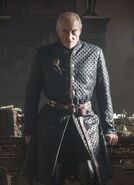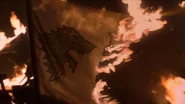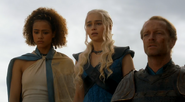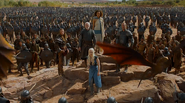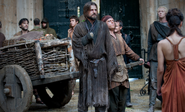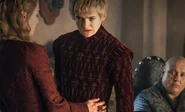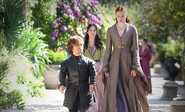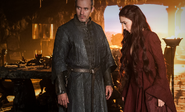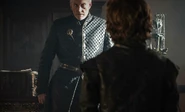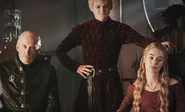"Mhysa" is the tenth and final episode of the third season of Game of Thrones. It is the thirtieth episode of the series overall.[1] It premiered on June 9, 2013. It was written by executive producers David Benioff and D.B. Weiss.
Plot
Template:S03E10 Synopsis
Summary
In the Seven Kingdoms
At the Twins, following the massacre of the northern lords at the Red Wedding, House Frey turns its soldiers on the northern army encamped outside their walls. The ensuing battle is a one-sided massacre as the leaderless northerners fight desperately for survival. Arya Stark and the Hound slip away from the carnage, but not before seeing her brother's mutilated corpse being paraded by Frey men-at-arms, his head cut off and replaced by his direwolf Grey Wind.
In the great hall of the castle the following morning, as servants clean up the aftermath of the Red Wedding, Lords Walder Frey and Roose Bolton gloat over their victory and the rewards their treachery has won them; Frey has become Lord of Riverrun and Bolton has been appointed Warden of the North in place of the Starks, until Sansa Stark and Tyrion Lannister produce an heir to The North. Bolton expresses some concern that Brynden Tully escaped the massacre but Frey dismisses his concerns, pointing out the Blackfish is alone and outnumbered against Houses Frey, Bolton, and Lannister. Bolton makes plain his contempt for Robb Stark, considering the late boy-king arrogant, incompetent and unwilling to take Roose's advice and make the hard decisions needed to win. Walder questions Bolton about his intentions to take Winterfell as his seat and asks how the castle ended up a ruin. Roose explains that his bastard Ramsay offered Robb Stark's terms that the ironborn occupiers would be shown mercy if they handed over Theon Greyjoy, but when they did they learned that Ramsay, in his father's words, "has his own way of doing things" and flayed them alive.
At the Dreadfort, Ramsay Snow eats his breakfast of a thick sausage, taunting Theon about his recent emasculation and laughing as Theon finally begs for death as a release from the nightmare. Ramsay tells him that he is more valuable alive than dead so the answer must be no. Ramsay notes that Theon reeks, and decides that that shall be his new name: Reek. Ramsay beats Theon, who eventually breaks down and says his name is Reek.
On Pyke, Balon Greyjoy reads a message from Lord Bolton's bastard while his daughter Yara Greyjoy cautiously opens a box crudely carved with the Greyjoy kraken. As Ramsay's letter explains the box contains "Theon's favorite toy." The message bluntly says that the ironborn have until the full moon to withdraw from the North or receive more bits and pieces of Theon. In addition any remaining ironborn will be flayed alive - just as Ramsay flayed alive Theon's twenty ironborn followers at Winterfell after they surrendered, even though he had promised them safe passage. It was in fact Ramsay Snow and his soldiers from House Bolton who burned Winterfell to the ground: he simply sent false reports for his father Roose to deliver to Robb Stark which falsely claimed that the ironborn were responsible, as the Boltons were preparing to betray the Starks months before the Red Wedding.
Balon is indifferent to Theon's situation since he defied Balon's orders and Yara's common sense when he stayed at Winterfell. Furthermore he cannot further the Greyjoy line, as the contents of the box prove. Yara has finally had enough and announces her intention to take her fastest ship, her fifty best men, sail around Westeros, besiege the Dreadfort, and liberate Theon.
In the Riverlands, a despondent Arya Stark and Sandor Clegane ride away from the outskirts of the Twins. They pass close to a small group of Frey men, one of whom is bragging about being one of the men who cut off Grey Wind's head and attached it to Robb Stark's body. Arya approaches them and asks to warm herself by the fire. She offers the coin given to her by Jaqen H'ghar as payment. When the Frey man investigates, she stabs him in the neck. Slightly thrown, the Hound deals with the others before demanding to know where Arya got the knife. She reveals it's his. As he grumbles and cleans up the bodies, Arya whispers, "valar morghulis".
Meanwhile, in King's Landing, Tyrion Lannister and Sansa Stark walk through the gardens. A pair of passing gentlemen snigger at Tyrion, either for his dwarf status or due to rumors he has not consummated his marriage. Sansa tells him to pay them no mind. Tyrion reminds Sansa that he's used to it, as he's always been a dwarf. He also states that he's not Joffrey, Tyrion would rather bide his time and humiliate them. Sansa playfully follows his line of thinking, and suggests "sheep-shifting"- secretly hiding sheep's dung deep within a mattress (as Arya used to do to her), so that the target always wakes up smelling of dung. Tyrion is amused but is confused by the term, though he realizes belatedly that Sansa has misheard the word "shit". He is rescued from having to explain his wife's mistake by Podrick Payne, who calls him to a meeting of the Small Council.
In Tywin's chambers Grand Maester Pycelle dithers over giving Tyrion a coded message from Lord Frey. Cersei and a jubilant Joffrey give an overview of the Red Wedding. Tyrion isn't particularly excited, already foreseeing the long-term problems that the incident will cause, but Joffrey brushes him off and gleefully states that he intends to serve Robb's severed head to Sansa at his wedding feast. None of the Small Council is able to mask how distasteful they find the concept. Varys points out that Sansa is Joffrey's aunt by marriage now and it would be unseemly not to give her the basic respect that accords. A deeply embarrassed Cersei forces a smile and insists to the rest of the council that Joffrey was only joking. This puzzles and incenses Joffrey, who proudly states he isn't joking, and pointedly commands Pycelle a second time to send the order to bring Robb's head to be served at his wedding feast. Tyrion flatly forbids it and tells Joffrey that Sansa isn't his to torment anymore. Joffrey angrily proclaims that he is the king, and everyone is his to torment. Tywin counters that a king who has to remind his subjects of the fact is no king. Joffrey goes apoplectic and tries to fight his grandfather, deriding Tywin as a coward who hid under Casterly Rock while Joffrey's father King Robert won the real war when he overthrew the Targaryens. The entire Small Council tenses waiting for Tywin to respond to this shocking insult: instead Tywin coldly and calmly declares that the king is tired and advises the Queen Regent to see him to bed. Tywin dismisses the rest of the council, save Tyrion, who is delighted at what has just happened: the lord of the Seven Kingdoms has been sent to bed without his supper. He then confronts Tywin about his part in the Red Wedding, noting that Walder Frey is a coward and would not have done something nearly this ambitious if he didn't have assurances from Tywin. The Hand blithely confirms it and dismisses Tyrion's concerns that the Northerners will never forget nor forgive such an outrage, believing setting a brutal example will break the Notherners and prevent future rebellions. Tywin again waxes poetic about family, particularly regarding Tyrion's failure to consummate his marriage to Sansa, but Tyrion finally has enough. He refuses to force himself on Sansa to do his duty, as well as noting that she is hardly likely to warm up to him after learning the Lannisters have murdered her mother and brother. Tyrion demands to know a single time that Tywin actually put his family members first, instead of just the family's prestige. Tywin says that was the day of Tyrion's birth: he wanted to leave him on the beach to be washed away by the sea, but Tyrion is a Lannister and Tywin couldn't bring himself to do it. Thus Tyrion should be outright grateful to Tywin for his mercy in not killing his newborn son the day he was born.
Immediately after leaving, Tyrion returns to his chambers and calls for Sansa, who simply regards him with a forlorn, tear-streaked face. Tyrion backs out, knowing that his sympathy would be rather cold comfort.
Elsewhere in the Red Keep, Varys meets with Shae. He tells her that he knows she is genuinely in love with Tyrion - and that is why she should take the diamonds he offers her and leave immediately for Essos to build a new, lavish life for herself. Varys is convinced that Tyrion is the last hope for the Seven Kingdoms' current regime, therefore Shae is a weakness that Tyrion, and thus the realm, cannot afford. Shae confirms that she is in love with Tyrion and that she cares deeply for Sansa as well, but in spite of her pain at seeing them together and the danger she poses, Shae will not leave until or unless Tyrion asks her to.
Unknown to everyone in King's Landing, Jaime Lannister, Brienne of Tarth, and Qyburn finally arrive; the city folk do not even recognise Jaime after his long absence from the capital. They make their way to the Red Keep, where Jaime immediately calls on Cersei, who regards him with a confused look as she takes in his disheveled appearance and missing hand.
At Dragonstone, Ser Davos Seaworth tests his new-found literacy on Stannis Baratheon's correspondence, declining Shireen Baratheon's invitation to read more tales of Aegon I Targaryen. He expresses dissatisfaction about the odd spelling of the word "night", before hearing the horns that signal Melisandre's intents to sacrifice Gendry. He argues with Stannis again about sacrificing the boy, but Stannis is convinced by Melisandre that using Gendry as part of her blood magic will give him the power to destroy his enemies and claim the Iron Throne. When he doesn't get through to his liege, Davos takes matters into his own hands and frees the boy, giving him a rowboat and directions to King's Landing. A furious Stannis tries to throw Davos back into the dungeon but the Onion Knight produces a letter from the Night's Watch. Davos insists that it is Stannis' duty to assist the black brothers, and that he will need Davos's assistance to rally troops and mercenaries. Melisandre burns the letter and acknowledges the truth: the War of the Five Kings is immaterial. The true war lies in the North, and evil and death are marching on the Wall. She also agrees that Davos has an important role to play in the events to come. Stannis laughs at R'hllor's sense of humor, noting that the god Davos likes to mock has chosen him for a higher purpose.
At the Wall
Arriving at the abandoned Nightfort, Meera Reed tells Bran, Hodor and Jojen that the castle is safe to enter. While around the fire Bran tells the story of the Rat Cook, a Night's Watch member who killed a guest under his roof, a sin the gods cannot forgive. Later that night, Bran is awoken by a sound, and wakes his companions in time to see something large climbing out of the castle well; Meera attacks and overpowers the intruder, who is revealed to be Samwell Tarly, accompanied by Gilly. Sam quickly deduces Bran's identity, seeing Bran's direwolf. Bran asks Sam to take him and his group north of the Wall, and though Sam protests the idea, given the threat of the White Walkers and the undead horde they command approaching, he eventually relents and takes them through the passage. Before they separate Sam gives the group the rest of his dragonglass supply and tells them that it has the power to kill White Walkers. The groups then head in different directions; Sam and Gilly for Castle Black, and the Reeds and Bran beyond the Wall.
At Castle Black, Sam and Gilly meet with Maester Aemon, who is furious at the prospect of Sam having violated his vows. Sam defends himself by reciting the Night's Watch oath to protect the realms of men whatever side of the Wall they are on and repeating Jeor Mormont's assertion that a wall of ice 500 leagues long and 700 feet high was not built to keep out barbarians. Aemon's demeanor softens upon learning that Gilly was one of Craster's wives, and acknowledges that she is now a refugee and should be sheltered. Aemon then orders Sam to begin writing letters immediately and make sure that all forty-four of Castle Black's ravens are well-fed, as every one of them is to fly that night: the White Walkers have returned, and Westeros must be warned.
Stopping to rest and tend to his injuries after fleeing the wildlings, Jon Snow finds himself confronted by a furious Ygritte, who has an arrow ready to shoot him. Jon tries to talk Ygritte out of shooting him, insisting that he still loves her. Though his feelings are clearly reciprocated Ygritte is still angered by his betrayal and shoots Jon three times with her bow as he flees from her.
Jon is badly injured, but his horse manages to carry him the rest of the way to Castle Black, as he hovers in and out of consciousness. Having reached safety, Jon is brought inside the castle by the guards, where he encounters Sam and Pypar, who are overjoyed to see him and insist that his injuries be taken care of.
Across the Narrow Sea
Outside the walls of Yunkai, Daenerys Targaryen and her advisors wait for the city's slaves to appear. Daenerys frets that the Yunkish slaves, who are better treated than Astapor's might have grown to like their chains and will not welcome freedom. Finally, the gates open and the freedmen pour out. Missandei begins to tell them of how Daenerys the Unburnt freed them, but Daenerys interrupts and says that it is the slaves' own choice to reach for their freedom. After a moment, one of the freedmen stretches his hand towards Daenerys and calls out "mhysa". After a moment, another follows suit, then another and another until the entire crowd is chanting "mhysa". Bewildered, Daenerys turns to Missandei, who reveals that the word means "mother" in the Ghiscari language. When the slaves advance on Daenerys, the Unsullied step into formation, but the queen tells them to stand down. Telling her dragons to fly, Daenerys steps out of the protection of the Unsullied and into the crowd, who carry on their chanting. Daenerys is embraced by the former slaves, offering a glimmer of hope in an increasingly darker world.
Appearances
- Main: Mhysa/Appearances
First
- Frey soldier #1
- Frey soldier #2
- Desmond Crakehall
- Eldrick Sarsfield
- Night's Watchman
- Fruit vendor
- Yunkai'i slave #1
- Yunkai'i slave #2
- Yunkai'i slave #3
- Yunkai'i slave #4
- Yunkai'i slave #5
Deaths
Production
Cast
Cast notes
- 21 of 24 cast members for the third season appear in this episode.
- Starring cast members Natalie Dormer (Margaery Tyrell), Jerome Flynn (Bronn) and Aidan Gillen (Petyr Baelish) are not credited and do not appear in this episode.
Notes
- As explained in the episode, "Mhysa", meaning "mother", is a Ghiscari loanword in Slaver's Bay Low Valyrian, hence why Daenerys didn't know it: though she speaks the Common Tongue, Dothraki, and several dialects of Valyrian, she doesn't understand Ghiscari.
- Tywin's reaction to Joffrey's insult during the Small Council scene contained non-verbal information in the books which is difficult to translate on-screen. Tywin's calm, almost nonchalant response to send Joffrey to bed is not meant to be humorous, but is in fact utterly terrifying to everyone in the room except Joffrey. Everyone else present (including Tyrion, the POV narrator for this chapter) has known Tywin for years, and know that Tywin has killed men for lesser insults. They all know that on the rare occasions that Tywin responds to insults not by yelling but by speaking with measured and cool words, it is because he is deliberately willing himself to appear calm, when he is in fact suppressing homicidal anger. Moreover, as Joffrey leaves Tywin says to himself that the boy will require a "sharp lesson" - which Tyrion recognizes as the exact same phrase which Tywin used when he forced Tyrion to watch as his guards gang-raped his first wife Tysha, because Tyrion had dared to marry a commoner. Tyrion knows that Tywin would never kill his own grandson, due to the taboo associated with kinslaying (otherwise he would have killed Tyrion simply for being a dwarf long ago), but Tywin now realizes just how crazy Joffrey is and intends to bring him to heel with a horrific punishment. Tyrion doesn't think that Tywin has thought of a specific punishment just at that moment, but still, his choice of words indicates that he intends for something on the scale of when he had his guards gang-rape Tyrion's wife.
- There are several call backs in this episode to previous events:
- Back in the Season 1 finale "Fire and Blood", when Joffrey shows Sansa her father's head on a spike, he threatened her that he intended to present her with her brother Robb's severed head as well; this episode reveals that he fully intends to literally follow through on that promise.
- In-universe, the Frey and Bolton soldiers mock how Robb's other bannermen first proclaimed him king by repeatedly shouting "The King in the North!" (in "Fire and Blood"), and subsequently used shouts of "the King in the North!" as their battle-cry for an independent Northern kingdom (in "Garden of Bones"). They mock this by sarcastically chanting "King in the North! King in the North! Here he comes, the King in the North!" as they parade his horrifically desecrated corpse around the Twins on a horse.
- Tywin dismisses everyone at the Small Council meeting, then says a flat "not you" to make Tyrion stay for a private conversation. This is similar to how he dismissed his war council back in "Fire and Blood".
- In the second episode of Season 1, "The Kingsroad", Tyrion remarked to Jon Snow that due to the social stigma of being a dwarf, his parents would probably have left him out in the woods to die as an infant if he had been born a peasant - but unfortunately for Lord Tywin, Tyrion was born into the noble House Lannister. This episode reveals that Tywin did indeed seriously consider killing Tyrion the day he was born by leaving him on the beach and letting the waves sweep him away, and he only relented because Tyrion is a Lannister.
- More loosely, Joffrey's tendency to defend any of his actions (no matter how ridiculous) by shouting "I am the king!" popped up routinely in Season 2, particularly when having Sansa beaten in front of the entire court in "Garden of Bones" or when foolishly starting a city-wide riot in "The Old Gods and the New". Tywin bluntly calls him out on this, pointing out that the man who has to insist people recognize that he's a king really isn't a king at all.
- This episode finally reveals that it was actually Ramsay Snow, son of Roose Bolton, leading soldiers of House Bolton who burned Winterfell to the ground during the Sack of Winterfell. This was not presented as a mystery in the books when it occurred at the end of the second novel, though it wasn't clear at the time if Ramsay did this on his own initiative or if his father Roose was actively planning to betray Robb Stark at the time (though it still isn't clear if Ramsay acted on Roose's orders or if Roose simply agreed with the decision after the fact). Ramsay simply wrote letters to his father and Robb earlier in Season 3 falsely blaming Theon's ironborn as responsible for the destruction of Winterfell - but even this lie wasn't clearly articulated until early Season 3. Thus fans who read the books and the Game of Thrones Wiki in particular were put in the difficult position of not being able to tell TV-first fans who was responsible, as this would have been spoilers, even though it wasn't a mystery in the books.
- This episode also reveals that the that the twenty ironborn raiders who joined Theon in betraying the Starks and capturing Winterfell, only to then betray Theon himself by knocking him out and handing him over to the Boltons in return for promise of safe passage, were rewarded as traitors deserve: Ramsay broke his promise and flayed each of them alive.
- Characters in the books later describe Roose Bolton as a cold, calculating psychopath, who genuinely has no real emotions and seems oddly distant from normal people. The TV series matches this well at the end of Roose's scene with Walder Frey in this episode, when he gives a smile that comes off as oddly stilted and forced - Roose doesn't have real emotions, and doesn't comprehend the mannerisms made by people who do have emotions. While Roose can from time to time mimic emotional responses such as smiling, it comes off as strangely artificial.
- Walder Frey says he thinks the Great Houses are hypocritical for looking down on him for marrying teenaged girls well into his eighties and nineties, but no one criticized Jon Arryn when he married "that Tully bitch", Catelyn's sister Lysa Tully. Walder misses the point, however, in that while the other Houses are disgusted at the massive age difference between Walder and his young brides, this isn't the main reason they look down on him. Rather, the other Great Houses are disgusted by Walder Frey and his entire family due to their utterly shallow loyalties, i.e. how Hoster Tully infamously dubbed him "the late Walder Frey" because he intentionally marched the forces of House Frey so slowly that they wouldn't reach the Battle of the Trident until it was already over, providing absolutely no real help during Robert's Rebellion. Moreover, within the TV series, other vassals of House Tully from the Riverlands joined Robb Stark's army without question because they had sworn oaths of allegiance to the Tullys. When Catelyn pointed this out to Walder in Season 1's "Baelor" he waved it off as "I said some words" which meant nothing to him - unlike the other sworn Tully vassals, Walder Frey only aids Robb Stark after extorting his own overlords into promising that Robb and Arya will enter into marriage alliances with House Frey. Other lords marry younger brides, but what Walder can't even comprehend is that other people take oaths seriously and are outraged when he casually breaks them - first oaths of loyalty, but now he has revealed that even the sacred oath of guest right means absolutely nothing to him: it's just "some words". The Freys even break basic social oaths such as not desecrating the bodies of fallen enemies, by instead gleefully mutilating Robb Stark's corpse and triumphantly parading it around their castle.
- The TV series has curiously not chosen to show many of the rival kings during the war wearing crowns. Joffrey and even Renly had crowns, but Robb, Stannis, and Balon have never been shown with their crowns. In the novels, Stannis has a new crown made resembling a circle of metal flames around his head, in honor of the Lord of Light, while Balon wears a traditional crown made out of driftwood which the Kings of the Iron Islands used to wear in past centuries. The old Kings in the North used to wear a crown consisting of a simple circlet of bronze, engraved with the Old Tongue runes of the First Men, surmounted by nine black spikes shaped like longswords. The crown was intentionally simple and only made of the basic metals of war, not containing gold or precious gemstones, to emphasize the grave nature of the Kings in the North, in contrast with the flamboyant heraldic excesses of the Andal kingdoms to the south. The crown was taken away when the Starks bent the knee during the Targaryen Conquest three centuries ago, but when Robb is declared the new King in the North the smiths at Riverrun create a very accurate replica which he wears. In the books, when Robb Stark's corpse was mutilated by cutting off his head and sewing his direwolf Grey Wind's head in its place, the final act of desecration was when the Freys (possibly Lord Walder himself) proceeded to nail Robb's crown onto Grey Wind's head - further reinforcing the utter body horror of the moment. Robb's desecrated corpse with the crudely "crowned" direwolf head sown onto it remains one of the most iconic images of the novels.
- Curiously, exactly what happened to Robb Stark's badly mutilated corpse after the Red Wedding has not been mentioned in the novels so far. It was decapitated with a direwolf's head sewn on it, but it was still physically present, and the Freys certainly didn't return it to the Tullys at Riverrun to give it a proper burial. Maybe they threw it in a garbage heap, or threw it in the river, or burned it, or maybe they propped it up to rot at the front gate of the Twins: it has never been stated. What happened to Robb's crown, however, has been revealed: it was subsequently taken by Ryman Frey, eldest son of Lord Walder's own eldest son Stevron Frey, who died earlier in the war leaving Ryman as Lord Walder's heir. Ryman gave Robb's crown to a prostitute, whom he sarcastically crowned the "Queen of the Whores", and takes to having her wear Robb's crown while he has sex with her in his command tent.
- Arya killing the Frey soldiers by pretending to be cute and starving, dropping a coin, then stabbing the man who picked it up was moved around from earlier in the books - Arya used this trick against a Bolton soldier when she was escaping Harrenhal (albeit the Boltons hadn't turned on the Starks yet). Arya's inner POV narration from the books includes an added joke which is lost in a TV adaptation: when she insists "but I'm hungry", she thinks to herself "but not for food" - she's indirectly telling the soldier she's hungry for revenge right before she kills him.
- Arya's line emphasizing that the Frey soldier was the first man she has killed is (as the in-episode guide points out) a reference to how the first person she killed was a Stableboy who tried to stop her from escaping from the Red Keep during the betrayal and massacre of her father's household.
- The final scene generated some negative attention from critics, who perceived colonialist undertones in having a platinum blond, pale-skinned aristocrat liberating a society of dark-skinned slaves.[2][3]
- Yunkai having uniformly dark-skinned slaves is technically inconsistent with the books, in which the Slaver's Bay cities took slaves from whatever population was at hand indiscriminately.[4] Indeed, the books make clear that the slave-masters basically just "enslave" anyone they are able to overpower and slap chains onto. Even passing ships from the Free Cities will be attacked in slaving raids and the children sold into slavery. The books explicitly state that several of Daenerys' Unsullied are ethnically Lysene, who are characteristically blonde haired, light-skinned, and blue-eyed. "Slavery" in Essos is similar to slavery in Ancient Rome and Greece, which was based on socio-economic more than ethnic lines. George R.R. Martin explained that the crowd of slaves was mostly composed of dark-skinned people as a side effect of filming the scene in Morocco using exclusively local extras.[5]
- Martin also reiterated that the "slavery" in Essos is much like the Greco-Roman version of socio-economic slavery: "Slavery in the ancient world, and slavery in the medieval world, was not race-based. You could lose a war if you were a Spartan, and if you lost a war you could end up a slave in Athens, or vice versa. You could get in debt, and wind up a slave. And that’s what I tried to depict, in my books, that kind of slavery. So the people that Dany frees in the slaver cities are of many different ethnicities, and that’s been fairly explicit in the books. But of course when David [Benioff] and Dan [Weiss] and his crew are filming that scene [of Daenerys being carried by freed slaves], they are filming it in Morocco, and they put out a call for 800 extras. That’s a lot of extras. They hired the people who turned up. Extras don't get paid very much. I did an extra gig once, and got like $40 a day. It's probably actually less in Morocco since you don't have to pay quite the same rate. If you're giving 800 Moroccans 40 bucks each, you're not going to fly in 100 Irishman just to balance the racial background here. We had enough trouble meeting our budget anyway. I know for some readers, they don’t care about this shit. But these things are about budget and realism, and things you can actually do. You are shooting the scene in a day. You don't have a lot of time to [worry] about that, and as someone who has worked in television this kind of stuff is very important to me. I don't know if that is answer or not. I made that answer, and some people weren't pleased with that answer, I know. They are very upset about that."[6]
- Of course, part of Daenerys' ongoing storyarc in the books is that the rulers of Slaver's Bay directly accuse her of being a foreigner with a messiah complex who just dropped into Slaver's Bay with no knowledge of local politics but who idealistically thinks she can change the world. Moreover, Daenerys' ongoing plotline is that wanting to be a great savior is good in theory, but she now has to face the practical fallout of her actions - i.e. she honestly never thought how she would feed 200,000 slaves once she had freed them.
- This episode was nominated for the 2013 Primetime Emmy award for Outstanding Cinematography For A Single-Camera Series.[7]
Memorable Quotes
Joffrey Baratheon: "I am not TIRED."
Yara Greyjoy: "I'm going to march on the Dreadfort, I'm going to find my little brother and I'm going to bring him home."
Tywin Lannister: "Any man who must say 'I am the king' is no true king."
Theon Greyjoy: "Reek. My name is Reek."
Ramsay Snow: "Do you think I'm some sort of savage?"
Varys: "We learn their language but we'll never be their countrymen."
Arya Stark: "Valar Morghulis."
Jon Snow: "I do know some things. I know I love you. I know you love me."
Image Gallery
References
- ↑ WinterIsComing.net, February 28, 2013.
- ↑ Template:Cite news
- ↑ Template:Cite news
- ↑ Template:Cite news
- ↑ Template:Cite web
- ↑ [1]
- ↑ http://www.emmys.com/shows/game-thrones

